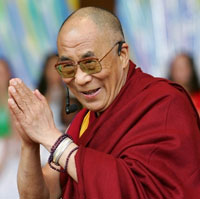Dalai Lama to break tradition and to appoint successor
The Dalai Lama announced that instead of counting on reincarnation he may appoint a successor or hold democratic elections before he dies.

The exiled leader accused Chinese authorities of stepping up persecution of Tibetan monks and civilians, and called the region's relations with the central Chinese government "the most tense in recent years," according to the Sankei Shimbun, a national daily.
"The Tibetan people would not support a successor selected by China after my death," the Dalai Lama was quoted as telling the paper during a trip to Japan.
"If the Tibetan people wish to uphold the Dalai Lama system, one possibility would be to select the next Dalai Lama while I am still living. Among options being considered are a democratic selection by the high monks of Tibetan Buddhism, or the appointment of a successor by myself," the leader was quoted as saying.
For centuries, the search for the reincarnation of religious leaders, known as lamas including Tibet's spiritual head, the Dalai Lama has been carried out by Tibetan monks following the leaders' deaths.
But a recent order by China that Beijing must approve all lama appointments have lead to concerns that the central government may forcibly select a pro-Beijing leader once the current popular Dalai Lama is dead.
China has ruled Tibet with a heavy hand since its Communist-led forces invaded in 1951, and it has accused the Buddhist monk of defying its sovereignty by pushing for Tibetan independence.
The Dalai Lama says he wants "real autonomy" for Tibet, not independence. He has lived with followers in exile in India since fleeing Chinese soldiers in 1959.
The Dalai Lama arrived in Japan last week for a nine-day visit. He has been snubbed by Japanese officials, who are working to improve relations with neighboring China.
Subscribe to Pravda.Ru Telegram channel, Facebook, RSS!


